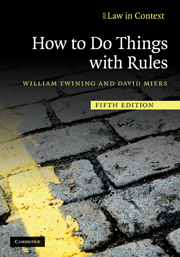Book contents
- Frontmatter
- Contents
- Preface
- Online appendices
- Acknowledgements
- Abbreviations
- Table of statutes and legislative instruments
- Table of cases
- Part I
- Part II Reading, using and interpreting rules in general
- Part III Reading law: reading, using and interpreting legislation and cases
- Part IV
- Index
- Resources on the web
- Appendix I Supplementary materials and exercises on Chapter 1
- Appendix II Normative and legal pluralism
- Appendix III Visual presentation of rules
- Appendix IV The Reading Law Cookbook
- Appendix V Supplementary materials and exercises on Chapters 7–10
- Appendix VI Supplementary materials and exercises on Chapters 9 and 11
- Appendix VII Domestic violence: a case study
- Appendix VIII MPs' expenses: a case study
- Appendix IX Hunting Act 2004: a case study
Appendix II - Normative and legal pluralism
Published online by Cambridge University Press: 05 June 2012
- Frontmatter
- Contents
- Preface
- Online appendices
- Acknowledgements
- Abbreviations
- Table of statutes and legislative instruments
- Table of cases
- Part I
- Part II Reading, using and interpreting rules in general
- Part III Reading law: reading, using and interpreting legislation and cases
- Part IV
- Index
- Resources on the web
- Appendix I Supplementary materials and exercises on Chapter 1
- Appendix II Normative and legal pluralism
- Appendix III Visual presentation of rules
- Appendix IV The Reading Law Cookbook
- Appendix V Supplementary materials and exercises on Chapters 7–10
- Appendix VI Supplementary materials and exercises on Chapters 9 and 11
- Appendix VII Domestic violence: a case study
- Appendix VIII MPs' expenses: a case study
- Appendix IX Hunting Act 2004: a case study
Summary
Note: With growing awareness of ‘globalization, the topic of normative and legal pluralism has become a central topic in legal theory, comparative law and several specialized fields of law. Although, strictly speaking, it falls outside the scope of this book, some teachers may choose to devote class time to it. Section 3 of Chapter 1 contains some materials that introduce the topic briefly. This Appendix reproduces some additional materials which can be used as a basis for discussion in connection with William Twining, General Jurisprudence (2009), ch. 16 (b).
Case studies
Sudan Government v. El Baleila Balla Baleila and Others (1958) Sudan Law Journal and Reports 12
One day in 1957 a train ploughed into a herd of cattle crossing the railway track in a plain in the Western Sudan, killing about 80 head of cattle and injuring others. The victims belonged to the family of the Arab herdsmen who were looking after them. Some six or seven herdsmen ran towards the deceased and after arguing with him, some of them speared him to death. The Major Court (trial court) acquitted five of the six accused but convicted one (A1) of murder under the Sudan Penal Code. On appeal he pleaded that he was ‘deprived of the power of self-control by grave and sudden provocation’ under s 249(1) which defined the offence of culpable homicide not amounting to murder. The Sudan Penal Code was based on the Indian Penal Code which in turn was based on English criminal law. The defence of provocation was rejected at first instance, but on appeal the Chief Justice, Mohammed Abu Rannat, reduced the finding of murder to culpable homicide.
- Type
- Chapter
- Information
- How to Do Things with Rules , pp. 427 - 435Publisher: Cambridge University PressPrint publication year: 2010



